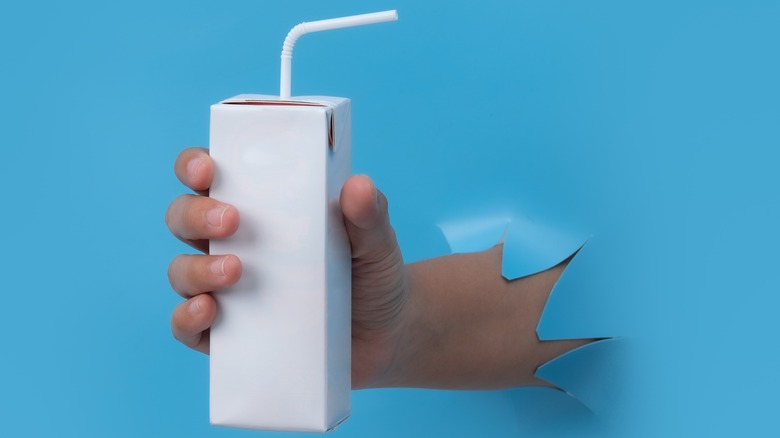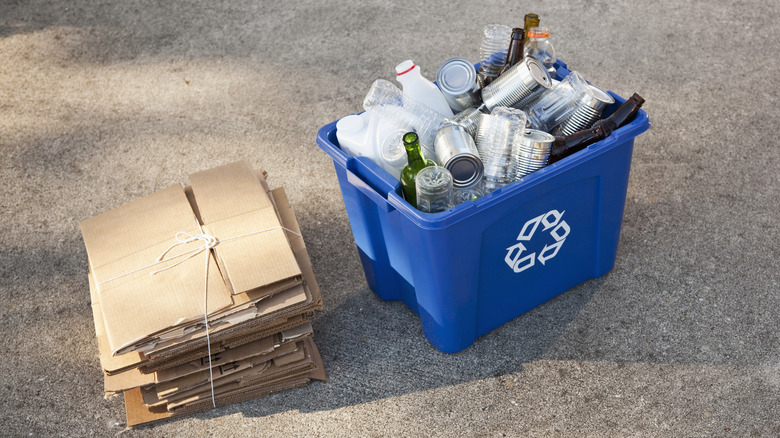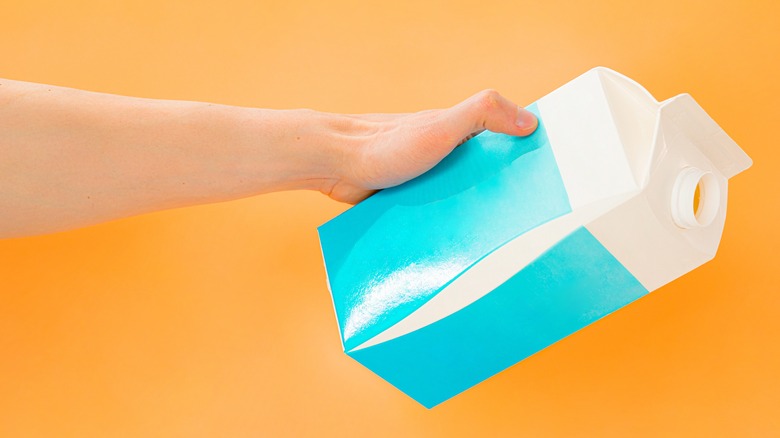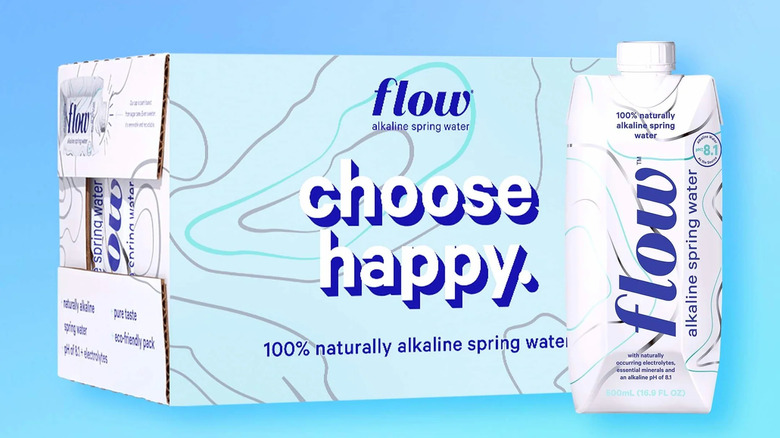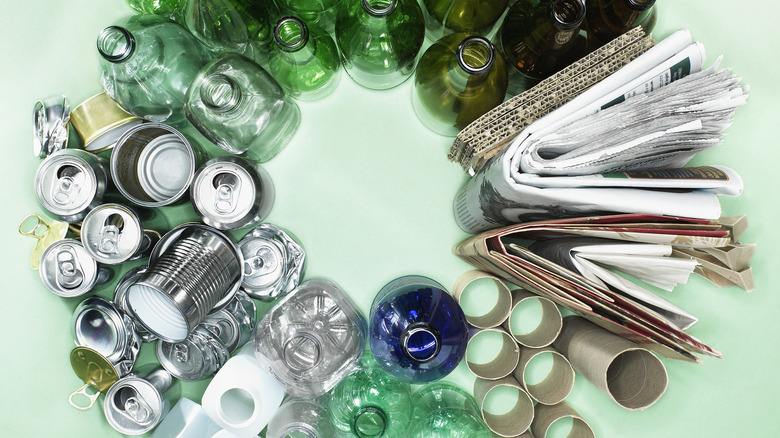Is Boxed Water Really More Sustainable Than Its Plastic Alternative?
If you keep in touch with efforts to keep our planet greener, you've likely heard that plastic water bottles are a personal and environmental hazard. We're not supposed to refill plastic water bottles, lest we ingest more microplastics than we already do, but if we trash them, they'll likely end up in a landfill — sometimes even when we think we've recycled them properly. Enter boxed water, a supposedly more sustainable alternative.
This trend of selling water in portable cardboard containers was kicked off in 2009 by Boxed Water is Better, a brand which claims to sell 100% recyclable cartons of water, styled after cardboard milk and juice cartons. Still, questions have arisen around about its claims of an environmentalist breakthrough. Unfortunately, boxed water cartons from any company probably aren't much more earth-friendly than their plastic counterparts, if they're any more sustainable at all.
This is largely because these water containers aren't made from pure cardboard (i.e. paper), but are instead from a mix of paper, plastic, and aluminum. Why is this an issue when all of these materials are recyclable? It all comes down to convenience for consumers and the efficiency of American recycling centers.
Can you recycle boxed water cartons?
To properly recycle goods, one of the most important things to do is separate them by type. Plastic, metal, and glass recyclables can be disposed of together, but all paper recyclables must be grouped with other paper products. A container that is made from paper, plastic, and metal — like many boxed water containers — would not be able to be recycled, unless it was broken down and separated by material in a well-equipped recycling facility.
The type of packaging used by Boxed Water is Better is known as an aseptic carton. This type of cardboard carton is often used for products like boxed chicken stock, juice, or milk, with additional plastic and aluminum components to insulate the product and keep it fresh. And aseptic cartons are improperly recycled at a very high rate, according to a 2017 study from the New York City Department of Sanitation. This is because they are actually supposed to be recycled with your glass, plastic, and aluminum bottles, not with paper products.
While some municipal recycling centers have machines that can scan and identify mixed-material cartons, which can then be brought to a facility capable of breaking them down and recycling them, not every district in the U.S. has access to these kinds of services. So, despite the best intentions of boxed water companies and the consumers who support them, the boxes themselves aren't foolproof to recycle, and might just end up in a landfill anyway.
Not many aseptic cartons get recycled
Even if you understand how to recycle aseptic cartons, the district where you live still might not be able to process them. According to the Carton Council, just over 60% of U.S. households had access to carton recycling in 2017, and only about 20% of cartons actually get recycled. Most plastic water bottles are made from a plastic called polyethylene terephthalate or PET, which had a higher 29.1% recycling rate in 2018, according to the U.S. Environmental Protection Agency.
Boxed Water is Better also notes that 26% of the material in its cartons consists of plant-based plastic, also known as bio-based plastic. This sounds like a boon, but the brand's website doesn't specify what kind of bio-based plastic these products use, and not all of these plastics are recyclable. Some varieties are compostable or biodegradable, but others are designed like petroleum-based plastics, and can just last as long in a landfill (per EPA). That's an estimated 450 to 1,000 years.
Plant-based plastics are also not always compatible with petroleum-based plastics, so they cannot always be recycled together. This further complicates the handling of aseptic cartons, and perhaps makes you wonder just how straightforwardly they help our planet.
Are other boxed water brands more sustainable?
Though Boxed Water is Better is the most recognizable name in the game, plenty of other brands make boxed water products — but with similarly confusing sustainability claims. Flow, which sells boxed alkaline water, says on its website that its packaging is "68-75% renewable and 100% recyclable." However, a different page on the site calls the packaging "68-75% renewable and recyclable," making the actual statistics unclear. Flow cartons also have an aluminum lining, which brings up the mixed materials quandary yet again.
The brand JUST, which sells both water in aluminum bottles and cartons, also uses a mix of plastic and aluminum in its packaging. It does specify that its boxed water containers are only recyclable where carton processing is available, which is more forward than the info available online from Boxed Water is Better. All of these snags make you wonder: Are brands really allowed to advertise recyclability as the main draw of their products, when recycling them is actually so complicated that they're likely to be thrown away regardless?
The answer is yes: According to the Federal Trade Commission, brands can label their products as recyclable if they can be recycled in theory, regardless of how limited consumers' options are. In other words, an item can technically be recycled (and labeled that way), but you might not be able to find a facility near you that could do it properly.
Is cardboard is still better than plastic in the end?
It can be hard to tell exactly how sustainable aseptic cartons are. Many of the existing studies and research around them come from groups like the Carton Council, whose membership is made up of the largest producers of aseptic packaging in North America. There's also info from Packaging Gateway, another industry manufacturer, and pro-plastic lobbying groups like the Center for Accountability in Science. Each organization has its own interests to protect with how they release and phrase this information.
As for points in favor of boxed water, some facilities do have an effective way to recycle aseptic cartons: Hydropulping, or the process of separating the paper in the carton from the other components so each can be recycled the right away. It's also true that cardboard decomposes much faster than plastic, with a timespan of around 5 years. The other parts of your boxed water may take a lot longer, but this is definitely a win for cardboard itself.
At the end of the day, boxed water cartons may be better — but only if the means to recycle them are accessible, and consumers are informed on how to properly recycle them. At this point in time, neither of these aspects of guaranteed for everyone across the U.S., nor around the world. Research which recycling options are available in your area, and use your own judgment from there, whether you choose you try boxed water or stick to bottles.

